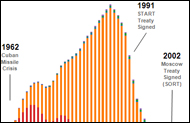
The size of the U.S. stockpile of nuclear warheads was officially disclosed in May to promote transparency and give a boost to non-proliferation efforts, according to the Department of Defense. Once a closely guarded secret, the number of nukes was released on background, or without attribution, by a DOD official. As of Sept. 30, 2009, there were 5,113 warheads in the U.S. arsenal -- an 84 percent reduction from the stockpile's peak in 1967. From 1994 through 2009, the U.S. dismantled 8,748 warheads, the department said.
Non-proliferation and Nuclear Weapons States
As a signatory to the Nuclear Non-Proliferation Treaty (NPT), the U.S. is one of five "declared"or internationally recognized nuclear weapons states. The other four are Russia (which is the heir to arms control treaty obligations of the former Soviet Union), China, the United Kingdom and France.
The NPT rests on an implicit bargain between the nuclear haves and have-nots. Nuclear powers pledge not to proliferate, or transfer nuclear weapons while the non-nuclear states are guaranteed access to the peaceful use of nuclear power, according to the treaty. The five declared nuclear weapons states have pledged to reduce the size of their nuclear arsenals over time with the eventual goal of elimination of all nuclear weapons.
Estimating Nuclear Stockpiles
The exact size and composition of nuclear stockpiles is still a closely guarded secret around the world. Besides the United States, only the United Kingdom and France have released some current weapons data. To make historical comparisons, we have to rely on estimates made by nuclear experts. The data from 1945 to 2002 are estimates made by the Natural Resources Defense Council and were published in the Bulletin of the Atomic Scientists in 2002 . The data for 2003 to 2009 are the official figures released in a Department of Defense fact sheet (PDF).
Official counts are not available for the other four declared nuclear weapons states, but here are the latest estimates based on statements from public figures and analysis published in the Bulletin of the Atomic Scientists:
Russia 4600
France 300
China 240
U.K. 225
Use the interactive stack graph below to compare the nuclear stockpiles over time.
Slimming Down the Stockpiles
Since the end of the Cold War and the dissolution of the Soviet Union, two treaties have reduced Russian and American stockpiles by thousands of warheads.
The Strategic Arms Reduction Treaty, or START, was signed in 1991 and for the first time put a cap of 6,000 on operationally deployed warheads.
The Treaty on Strategic Offensive Reductions, or SORT, is widely known as the Moscow Treaty. It was signed in 2002 and limits both sides to 1,700-2200 operationally deployed warheads.
A third treaty has been signed but not yet ratified by the U.S. Senate or the Duma -- Russia's lower house of parliament. The New Strategic Arms Reduction Treaty, or New START, was signed in April of this year and would limit both sides to 1550 operationally deployed warheads.
Compare the treaties using this chart from the State Department.
Should the Senate ratify the New Start Treaty?
Are we safer with more or fewer nukes?
Data Sources
American Forces Press Service: U.S. Declassifies Nuclear Stockpile Details to Promote Transparency
Department of Defense: Fact Sheet (PDF) Official U.S. count data
Bulletin of the Atomic Scientists: NRDC Nuclear Notebook (PDF) 1945-2002 estimates
Russian Nuclear Forces, 2010 (PDF)
French Nuclear Forces, 2008 (PDF)
Chinese Nuclear Forces, 2008 (PDF)
FAS Strategic Security Blog: Britain Discloses Size of Nuclear Stockpile: Who's Next?
Nuclear Non-Proliferation Treaty
New START (PDF)
Data visualization by Anthony Calabrese, a State of the USA Web producer.
 Print This
Print This RSS Feed
RSS Feed